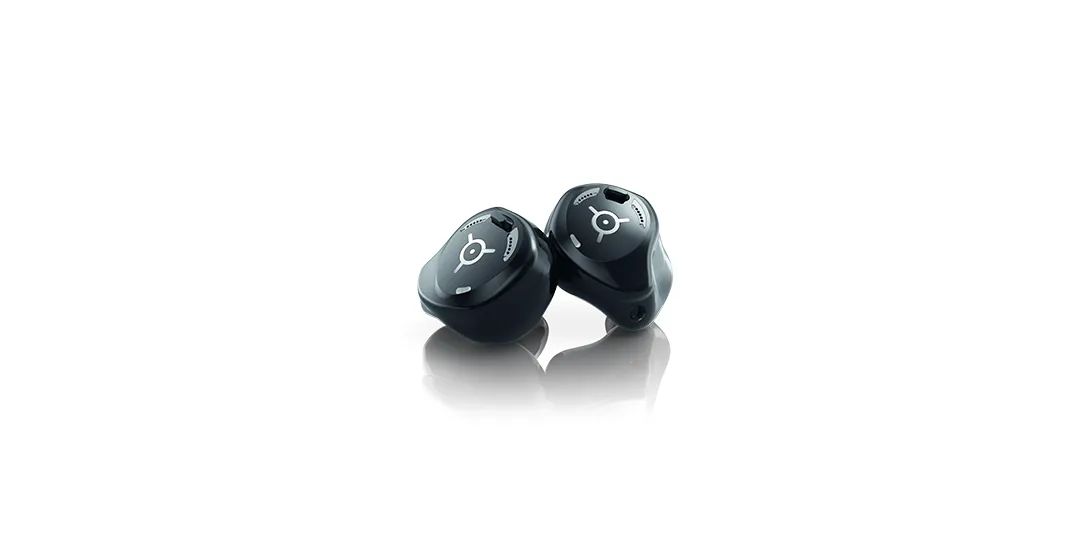Understanding hearing loss
After our eyes, the most important sensory organ is our ears, thus hearing loss has significant consequences.
After our eyes, the most important sensory organ is our ears, thus hearing loss has significant consequences. In most cases, hearing loss is age-related. However, it can also be triggered by loud noises or infections, or may be hereditary. Hearing loss may occur very suddenly, although in most cases it is gradual, and so you only become aware of it as it progresses. Fortunately, in most cases impaired hearing can be improved using a hearing aid. Find out how.
First signs
Hearing loss rarely occurs all of a sudden. It usually develops gradually, over a long period of time – and is therefore imperceptible at first. This is because those affected gradually get used to the onset of hearing loss. Because the brain can compensate for the hearing deficiencies for a long time, there are few disadvantages in everyday life during the first phase.
But from a certain point, hearing loss can no longer be readily compensated for. Often, this is noticed by family and friends of the affected person long before they themselves realize they cannot hear normally.
Even those affected by hearing loss who know that they can no longer hear perfectly often still do nothing for a long time. Using the argument "It’s still OK!", they put off a hearing test with an audiologist or ENT doctor. This is because being aware of your own hearing loss is one thing, but acknowledging it is not so easy.
The problem is that if you wait too long, you risk serious consequences. The ability to understand speech may be affected if hearing loss is left untreated. If you can hear these sounds again with a hearing aid, they may no longer be correctly interpreted, and are therefore often perceived as excessively loud and unpleasant – even if it’s something as harmless as the rustling of leaves or a friendly conversation next door.
The following three questions may help you find out if you have hearing loss:
[Sonova_Spacer:92bfcf25-4722-476d-812e-918e5a52f0c6]
You can find more information here on whether you might need a hearing aid:
What happens in the event of hearing loss?
The cause of hearing loss may be found at various points in our complicated, sensitive ears: the outer ear, the middle ear, the inner ear or even the auditory nerve. Hearing loss is not always age-related. It can also be triggered by loud noises, infections, poisoning or injuries, or may be hereditary.
It is mainly the higher frequencies that are affected first in most cases. Because these are important for hearing the so-called voiceless consonants (f, s, p, t), the understanding of speech is often impaired at an early stage. Depending on the type of hearing loss, other symptoms appear, for example tinnitus, noise sensitivity, or dizziness. In almost all cases, hearing loss is permanent, and it is often difficult to predict how it will progress.
What many of those affected are unaware of is that untreated hearing loss sooner or later also has an impact on the mind or on quality of life. People with untreated hearing loss often complain of chronic fatigue. For them, conversations are so stressful that they would rather avoid social contact, and they increasingly withdraw. The impact of this isolation can take a physical and emotional tole.
What can be done about hearing loss?
Whether or not a hearing aid can be used to compensate for or reduce hearing loss depends on the cause. In most cases, fortunately this is possible. When amplifying and modulating background noise, the hearing aid takes into account how the auditory response area in our heads processes sounds and voices. Modern technology therefore makes hearing easier and more comfortable again.
Digital technology separates voices from background noise, for example, making it easier for someone with hearing loss to understand and stay focused on a conversation. In addition, the hearing loss is compensated for so that both ears can work together again optimally, which improves precise directional hearing and therefore orientation. This trick works by the hearing aids on both ears communicating with one another.
Sudden Hearing loss and tinnitus – A result of stress?
In just a single moment, the world sounds quieter in one ear. Listening to voices and music suddenly sounds different – as if you’re wrapped in cotton wool. The phenomenon is called Sudden hearing loss, and should be treated by an ENT doctor as quickly as possible. The change in your ability to hear can be accompanied by tinnitus and balance issues. Although the specific cause is unknown, there are various theories that may explain it. In some cases , the cause can be determined by the ENT (viral infections, vascular disorders, immune system malfunction, an inflammatory injury to the ear, or blocked blood flow to the ear — or even some combination of these).
The quicker the Sudden hearing loss is treated the better the chances of a full recovery. If the symptoms do not go away on their own within 24 hours, make sure you see your doctor and get a referral to see an ENT doctor. Some mild sensorineural hearing loss may recover by itself, but the treatment is time sensitive for most of the cases and the hearing loss can became permanent.
Why does our hearing capacity diminish as we get older?
Age-related hearing loss (presbyacusis) is a natural process. It usually starts between the ages of 45 and 65, and can be worsened by external factors such as high noise levels. Age-related hearing loss mainly affects the higher frequencies, and usually occurs in both ears. It is caused by damage to the fine hair sensory receptor cells in the cochlea. This leads to diminished signal transmission to the auditory nerve. The first signs are often that noises such as rustling leaves or a watch ticking can no longer be perceived. Because age-related hearing loss occurs gradually, people often only become aware of it as it progresses.
It cannot be treated with medication or surgery; however, a hearing aid can be a great help with this form of hearing loss.
Is it genetic?
Some forms of hearing loss are genetic. They are caused by mutations in the genes that affect the development and function of the ear. Nowadays, it is known that, of the approximately 30,000 genes in humans, about 500 can influence hearing. Gene research continually leads to new findings in this area. For example, Prof. Claes Möller from the University of Örebro in Sweden has found that a modified or mutated gene is characterized by the production of either too much or too little protein.
Of all the congenital forms of hearing loss, two-thirds can be ascribed to such a gene mutation. In the other third, it is a syndrome, e.g. Usher Syndrome, in which patients have a combination of symptoms, also including visual impairment, amongst others.
The researchers’ main aim is to find out which gene is responsible for which type of hearing damage, so that those affected can be helped by gene therapies in the future.
How can this be prevented?
In order to hear, we not only need two functioning ears, but also an intact and trained auditory response area in the brain. This is because, in the so-called auditory cortex, the acoustic pulses are interpreted and transmitted to the conscious mind. Did you know that our sense of hearing stimulates our brains more than our sense of sight? The problem is that when the brain is no longer sufficiently "trained" due to hearing loss over a longer period, nerve endings are broken down.
As a result, the brain not only loses the ability to hear, but also ages faster overall. Timely treatment with a hearing aid can help slow the decline of this "training". We recommend a yearly hearing test from the age of 50.
Training your hearing the fun way, with music therapy
Music is not only the perfect way to improve your mood or relax, but it can also have a therapeutic effect – not only for depression and stress, but also for hearing loss.
The principle is that the complex combination of music and speech, in addition to rhythm, pitch, and timbre, can be used to practice speech comprehension and communication skills.
This is because those affected by hearing loss often find it difficult to follow conversations when there is background noise. Specifically, this can be practiced with music therapy, in a fun way. For people with hearing loss, music can be a way to find joy in hearing again, and can therefore lead to a better quality of life.
Hearing loss in numbers
Around 1.1 billion people worldwide are affected by hearing loss, which is approximately 16 percent of the world’s population
Only 1 or 2 in every 1,000 newborn babies is affected by significant hearing loss
One in three people over 60 years of age is affected by hearing loss
A third of all those with hearing loss are of retirement age
65 percent of people with hearing loss have mild hearing loss, 30 percent have moderate hearing loss, and only 5 percent have serious or profound hearing loss
Only one in five people who would benefit from a hearing aid actually uses one
On average, people with hearing loss wait a full 10 years until they do something about it
The basis used is the World Health Organization (WHO) definition, which states that a person with hearing loss of more than 25 decibels (dB) has hearing damage.
Reasons behind increased hearing loss
More and more people worldwide are being affected by hearing loss. The causes of this epidemic are directly linked to modern civilization and our lifestyle. The most important factors are:
[Sonova_Spacer:baea9165-7b74-4dac-8a44-03ab2882bca4]
Do hearing aids help with all types of hearing loss?
Most people with hearing loss benefit from treatment with a hearing aid; however, not every form of hearing loss can be compensated for using a hearing aid.
In principle, a distinction is made between three types of hearing loss:
conductive hearing loss,
mixed hearing loss,
and sensorineural hearing loss.
An important tip: If you feel that your hearing may have deteriorated recently, then don’t hesitate to visit an ENT doctor or audiologist, because, regardless of the cause of your hearing loss, early diagnosis gives you a significant advantage.
Conductive hearing loss usually relates to blockages or inflammation in the outer or middle ear. Depending on the cause, medication, syringing, or surgical intervention may help.
Mixed hearing loss is a combination of conductive and sensorineural hearing loss.
The most common category is sensorineural hearing loss, and the cause is found in the inner ear, in the region of the cochlea (damaged sensory cells) or – in rarer cases – in the auditory nerve. The sound does reach the inner ear, but it is not correctly transmitted from there.
The good news for those with sensorineural hearing loss is that you can usually compensate for this by using a modern hearing aid. This can noticeably improve your hearing.
Do hearing aids help even with mild hearing loss?
Most sounds in our daily lives – speech, music, the telephone ringing – are within a frequency range of 500 to 3000 Hertz (Hz). If your hearing curve falls below a threshold of 25 decibels (dB) in this range, then you have mild hearing loss. Even in this range, using a modern hearing aid is definitely advisable, since it can noticeably improve your hearing.
Treatment with a hearing aid may also be advisable if, despite not yet having reached the above-mentioned indicative limit, the person affected does have some psychological strain. Therefore, it’s not just the measurement that is the deciding factor; an individual’s subjective feeling is important too.
You can test the hearing aid together with the audiologist. Click here to find out how easy it is to get used to a hearing aid.
Other topics
[2Blocks-Headline_Cta_Repository:ab2045df-0e77-401c-bd89-447fe23a7eb3]
VAC, WCB, WSIB, ADP & ODSP accepted. Part of the WorkSafeBC Provider Network . * Based on national physician referrals over the tenure of the corporation's Canadian business operations compared to the disclosed referral count of leading competitors. **Hearing evaluations/tests are free for all customers over the age of 50. Some conditions and exclusions may apply. See clinic for details.
[Sonova.StoreLocatorWithInputCentralized:a29403ff-bcb2-45d8-8907-d3d33721ea2b]



